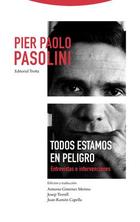
The interview was for Pasolini an expressive medium of his own, more literary than journalistic, which allowed him to clarify the aesthetic and social meaning of his proposals and to assert himself in front of his numerous critics. These conversations and interventions arise in line with the central events of the 20th century such as the resistance to fascism, the Second Vatican Council, postcolonialism, the 1968-1973 protests, the "tension strategy", the relations between the Soviet Union and the Soviet Union. Communist party, political extremism, mafia, corruption or incipient environmental problems, all on the backdrop of modernization. The persecution of which Pasolini was the object is fundamental to understand the fury and the need to account for oneself that these texts go through. Together with their correspondence, they are the ones that best reflect their solitude in front o...read more






